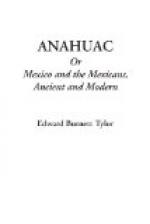interest in these Indian districts, and so trifling
a matter as a revolution and a change of people in
power does not affect them perceptibly. The Indians
are absolutely free, and have their votes and their
civil privileges like any other citizens. All
that the owners of the plantations ask of them is
to work for high wages, and hitherto they have done
this, but for years it has been becoming more and more
difficult to get them to work. All they do with
the money when they get it, is to spend it in drinking
and gambling, if they are of an extravagant turn of
mind; or to bury it in some out-of-the-way place,
if they are given to saving. If they were whites
or half-caste Mexicans they would spend their money
upon fine clothes and horses, but the Indian keeps
to the white cotton dress of his fathers, and is never
seen on horseback. Now this being the case, it
does not seem unreasonable that they should not much
care about working hard for money that is of so little
use to them when they have got it, and that they should
prefer living in their little huts walled with canes
and thatched with palm-leaves, and cultivating the
little patch of garden-ground that lies round it—which
will produce enough fruit and vegetables for their
own subsistence, and more besides, which they can
sell for clothes and tobacco. A day or two of
this pleasant easy work at their own ground will provide
this, and they do not see why they should labour as
hired servants to get more. This is bad enough,
think the hacendados, but there is worse behind.
The Indians have been of late years becoming gradually
aware that the government of the country is quite
rotten and powerless, and that in their own districts
at least, the power is very much in their own hands,
for the few scattered whites could offer but slight
resistance. The doctrine of “America for
the Americans” is rapidly spreading among them,
and active emissaries are going about reminding them
that the Spaniards only got their lands by the right
of the strongest, and that now is the time for them
to reassert their rights.
The name of Alvarez is circulated among them, as the
man who is to lead them in the coming struggle—Alvarez
the mulatto general, whose hideous portrait is in
every print-shop in Mexico. He was President before
Comonfort, and is now established with his Indian regiments
in the hot pestilential regions of the Pacific coast.
The undisguised contempt with which the Indians have
been treated for ages by the whites and the mestizos
has not been without its effect. The revolution,
and the abolition of all legal distinctions of caste
still left the Indians mere senseless unreasoning creatures
in the eyes of the whiter races; and, if the original
race once get the upper hand, it will go hard with
the whites and their estates in these parts. Only
a day or two before we came down from Mexico, the government
had endeavoured to quarter some troops in one of the
little Indian towns which we passed through on our
way from Temisco. But the inhabitants saluted
them with volleys of stones from the church-steeple
and the house-tops, and they had to retreat most ignominiously
into their old quarters among “reasonable people.”




